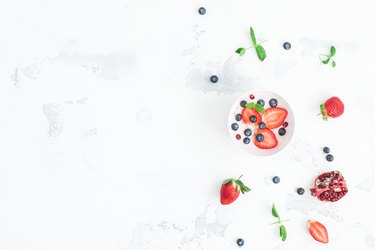
Ulcers can be painful and frustrating, but sticking to a strict esophageal ulcer diet can help you through the healing process. Ulcers can develop throughout the gastrointestinal tract, so it's important to follow the diet and exercise tips that are specific to your condition.
Video of the Day
Video of the Day
Esophageal Ulcer Diagnosis
Esophageal ulcers occur in the esophagus, which is the part of the body that ushers food and liquid to the stomach. Esophageal ulcer symptoms include pain when swallowing, heartburn, nausea, vomiting and chest pain. Several issues can cause these sores, including:
- Gastroesophageal reflux disease (GERD)
- Frequent or excessive vomiting
- Infections
- Chemotherapy or radiation
- Excessive irritants, such as cigarettes or alcohol
GERD is a condition in which stomach acid enters the esophagus, and it is the leading cause of these ulcers. If GERD is the cause of your pain, you will need to treat the underlying problem in order to allow the ulcers to heal and prevent new ones from forming. You should think about both the foods in your esophageal ulcer diet and the timing of your meals.
Michigan Medicine suggests that people with GERD eat several small meals throughout the day, instead of the standard two or three larger meals. Furthermore, you should avoid lying down until at least two hours after you eat. Regardless of the cause of your esophageal ulcer symptoms, following a special diet can help.
Read more: Foods That Alleviate Pain of an Ulcer
Soft and Low-Fat Foods
When you first develop an esophageal ulcer, you may notice that it is difficult to eat hard or crunchy foods. Sticking to soft foods and liquids can help lessen the pain. While smoothies and mashed potatoes may be your go-to soft foods, don't forget protein. Try adding options like tofu, scrambled eggs and Greek yogurt to add protein to each meal.
While all people with esophageal ulcers should stick to soft foods, other diet recommendations depend on the cause your doctor gave you with your esophageal ulcer diagnosis. For example, if GERD causes your ulcers, you may need to avoid high-fat foods and other triggers. The Cleveland Clinic recommends the following safe foods to avoid esophageal ulcer symptoms:
- Low-fat dairy products
- Plain bread items without butter and cheese
- Low-acid fruits
- Well-cooked red meat
- Poultry without the skin
- Tofu
- Potatoes without added fat
- Vegetables, except those that are possible triggers
Every person's trigger foods are different, so it's important to notice which foods worsen your GERD and ulcers. Perhaps the most important part of shortening your esophageal ulcer healing time is avoiding certain foods, rather than adding in others.
Avoid Consuming Irritants
With time and treatment your doctor prescribes, your esophageal ulcers should heal. However, eating too much of your trigger foods or consuming other irritants may delay your esophageal ulcer healing time. Harvard Health Publishing recommends avoiding:
- Peppermint and spearmint
- Coffee
- Whole-milk dairy products
- Chocolate
- High-fat foods
- Acidic foods like citrus and tomatoes
- Carbonated drinks
Of course, it may be difficult to avoid even small amounts of these trigger foods. However, you should try to limit consumption as much as possible as consuming trigger foods may slow down your esophageal ulcer healing time. If you find that a common trigger does not cause symptoms for you, you may be able to reintroduce it into your diet at a later point.
In addition to foods that can irritate your esophagus, you should avoid other irritants. Alcohol, caffeine, smoking and certain painkillers can all make an irritated esophagus worse. You should also take all medicine with a full glass of water and avoid lying down immediately afterward. Most importantly, follow all directions from your doctor.
- Michigan Medicine: "GERD: Esophageal Erosion and Ulcers"
- Cedars-Sinai Medical Center: "Esophageal Soft Food Diet Guidelines"
- Cleveland Clinic: "Lifestyle Guidelines for the Treatment of GERD"
- Mayo Clinic: "Esophagitis"
- Harvard Health Publishing: "Gastroesophageal Reflux Disease (GERD)"
- StatPearls: "Esophageal Ulcer"
Was this article helpful?
150 Characters Max
0/150
Thank you for sharing!
Thank you for your feedback!